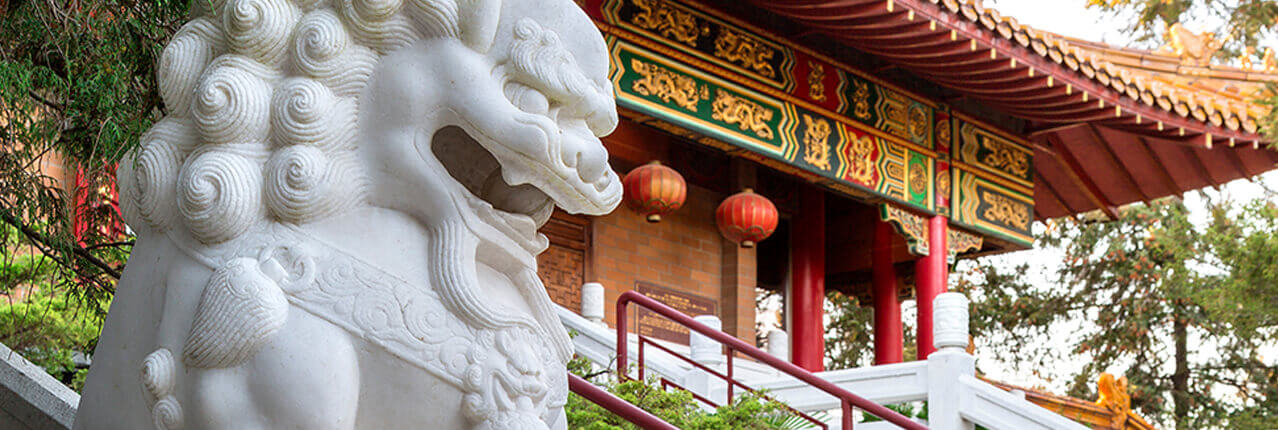Our general hours are 9:30 AM to 5:30 PM, seven days a week. The vegetarian cafeteria, Taste of Zen, is open from 11:30 PM to 3:00 PM, seven days a week, and the Thousand Buddha Hall is open from 9:30 AM to 4:30 PM. All other areas are open until 5:30 PM. Please note that we close our gates promptly at 5:30 PM.
The duration depends on what the visitor wishes to draw from the visit. The general first visit typically takes up to an hour.
Although we are open to the public, the temple is a place of worship and we ask all visitors to respect our rules and regulations. General rules include: no smoking, no littering, no photography or videotaping inside our buildings, and no non-vegetarian food on our premises. Signs that state additional rules and regulations are also placed throughout the grounds for reference.
No, the temple is open to the public and does not require an admission fee. Our main goal is to inform the public about Buddhist philosophy and our organization, and so we encourage visitors to come and explore our grounds. Guides and explanations in both English and Chinese accompany most of the features at the temple, for the convenience of visitors.
Yes. We offer guided tours for groups of 15 or more, to help visitors learn more about our temple and Buddhist philosophy. Please see Guided Tours.
The temple offers guided tours to schools and other educational institutions free of charge, to teach the public about Chinese art, culture, and Buddhist philosophy. For groups with no official affiliation to educational institutions, a recommended donation of $2.00 per person to the temple is greatly appreciated, so that we may continue to offer this service to the community.
Due to the limited staffing of tour guides, many of whom are volunteers, we currently only offer guided tours to groups of 15 people or more.
No, the International Buddhist Temple is open to the public regardless of ethnicity and religion. We wish to inform anyone who is open-minded and interested in learning about Chinese art, culture, and Buddhist philosophy. Members of other local and international religious groups have visited, or are even regular visitors of our temple. Numerous schools and other educational institutions arrange tours every year, in order to teach their students about the Buddhist faith and Chinese culture. Although everything at our temple is of Chinese or Buddhist origin, it is an international meeting place of minds. People from all walks of life can engage in multicultural and philosophical exchange here, which is why the founders chose the name International Buddhist Temple.
Individuals who are able to transfer out of their wheelchair should be able to access all buildings at the temple as we maintain a handicap lift in our inner courtyard. Our back building (Meditation Hall), is also wheelchair-accessible with an elevator and ramps.
Our Abbot, the Venerable Guan Cheng, teaches a beginner's course on Buddhism and Meditation in English every Saturday from 9:00 AM to 11:00 AM, and often lectures on various Buddhist topics or sutras. The temple also has a collection of books on Buddhism and Eastern philosophies for free distribution, adjacent to our cafeteria on the ground floor of the Main Gracious Hall. You can also visit our 'Teachings and Practice' page to learn more about the Buddhist teachings and philosophy.
There are two kinds of religious service that the monks and nuns at the temple can conduct for the deceased: chanting the Amitabha Sutra, or chanting the Ksitigarbha Sutra. The Amitabha Sutra lasts for 2 hours (from 1:30 PM to 3:30 PM). The Ksitigarbha Sutra takes about 3 hours (from 1:00 PM to 4:00 PM). Ancestral tablets with the deceased's name (with or without a photograph) can be also placed in the temple. With their names engraved onto wooden or plastic tablets, those who have passed on will be able to listen to the prayers of the monks and nuns everyday. As prayer services involve the chanting of sutras, the departed will benefit from recitations of the Buddha’s teachings so that they may too become enlightened and eventually enter Nirvana. Please contact a temple representative for more information.
Thank you for your interest in helping us to serve the community. Please fill out a volunteer form online, or drop by the temple to sign up. We greatly appreciate your kindness and effort.
Yes, there are two major schools of Buddhism: Mahayana Buddhism and Theravada Buddhism. Mahayana Buddhism teaches us how to attain Enlightenment for the sake of others. Theravada Buddhism teaches people how to attain personal spiritual liberation. Both traditions flourished in India, and subsequently spread throughout Asia and surrounding countries. Mahayana Buddhism is practiced in countries such as China, Korea, Vietnam, and Japan, whereas Theravada Buddhism is most commonly practiced in Sri Lanka, Burma, and Thailand. Although Mahayana Buddhism is practiced at the temple, our organization embraces both schools of thought, as both reflect the Buddha’s teachings. In fact, our temple has a number of affiliates and regular visitors who belong to the Theravada sect.

